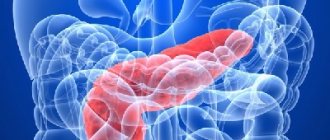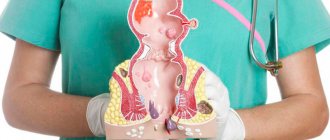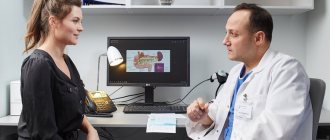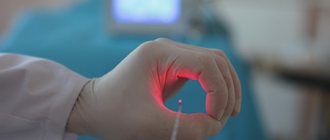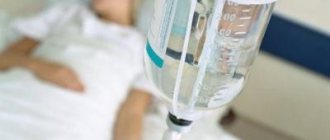Hundreds of patients face hemorrhoids every day. This delicate problem causes many unpleasant symptoms and reduces the quality of life. The causes of the disease include a sedentary lifestyle, pathologies associated with vascular dysfunction, intense physical activity and some other factors. Having encountered a problem, many patients do not know which doctor treats hemorrhoids. To make the correct diagnosis and choose the most effective treatment methods, it is important to understand which doctor to contact for hemorrhoids and how to properly prepare for the examination.
Disease concept
Before you figure out which doctor to go to with your problem, you should find out what hemorrhoids are? The pathology consists of damage to the veins of the rectum. In this case, the vessels are stretched, their integrity is disrupted, and cavernous formations appear that look like nodes or lumps. There are several types of disease. Among them, there is an internal or external type of pathology. In the first case, nodes appear on the inside of the rectum. In appearance, hemorrhoidal cones fall out through the anus. This process is accompanied by severe pain during bowel movements, bleeding, burning, and itching. In addition, lack of treatment often leads to complications such as vein thrombosis, proctitis, paraproctitis, anemia and others.
Only a doctor can cure hemorrhoids!
Fans of self-medication, as well as those who hope that hemorrhoids will resolve on their own, should remember that without qualified therapy, the disease will continue to progress and, most likely, become chronic.
Some patients with hemorrhoids, when deciding which doctor to see, choose all sorts of traditional healers who can relieve pain without eliminating the cause of the problem.
During the time spent on pseudo-treatment, the disease reaches the last, fourth stage, in which prolapse of nodes occurs with any, even the weakest, physical stress, and sharp, unbearable pain becomes a constant companion of the patient.
To prevent this from happening, be treated only in high-quality clinics with certified proctologists, who have classical medical education, vast experience and the enormous capabilities of modern medicine.
And in order to choose the best clinic and find which doctor can handle your hemorrhoids best, of course, you should listen to the reviews of other patients and entrust your health only to well-established medical institutions. Undoubtedly, the URO-PRO network of clinics is one of these!
Why you need to go to the doctor
Like any other disease, hemorrhoids gradually progress, which causes the risk of developing certain complications. With grade 3 and 4 pathology, the patient may develop a severe inflammatory process, tissue suppuration, abscess, heavy bleeding, and wound infection. That is why you need to contact a specialist in the early stages of the disease. When the first signs appear, such as itching, burning, pain during bowel movements, sensation of a foreign body in the anus, you should make an appointment with a doctor as soon as possible.
Important! A quick response to the problem and well-chosen conservative therapy will help to avoid serious complications and surgical treatment.
Why do hemorrhoids occur?
The risk of developing the disease increases when exposed to the following unfavorable factors:
- Regular retention of stool (chronic constipation);
- Lack of physical activity;
- Features of professional activity (truck drivers, programmers, builders, salesmen, accountants, etc.);
- Lifting heavy objects;
- Adherence to various dietary patterns;
- Passion for certain sports;
- Hereditary predisposition;
- Errors in the diet (consumption of spicy and fatty foods), alcoholism.
Which specialist treats the disease?
Treatment of hemorrhoids for each patient is selected individually, depending on the diagnosis. Answering the question of which doctor treats hemorrhoids in women and men, it should be said that the main specialist dealing with the problem is a proctologist or coloproctologist. It is these specialists who are involved in the diagnosis, treatment and prevention of pathologies that occur in the rectum.
The main specialist involved in the treatment of hemorrhoids is a proctologist
Indications for visiting a proctologist:
- all types of hemorrhoids;
- development of thrombosis of hemorrhoids;
- trauma to the anus and rectum;
- formations in the anus of a benign or malignant nature;
- formation of anal fissures;
- prolapse of hemorrhoidal cones;
- development of inflammation and other negative symptoms.
Coloproctologist and proctologist are specialists of the same profile. Therefore, if you suspect you have hemorrhoids, it is recommended to consult one of these doctors.
Reasons for the development of hemorrhoids in women
There are many reasons that can affect the development of hemorrhoids in women, including:
- pregnancy and childbirth;
During pregnancy, the size of the fetus constantly increases. There is strong pressure on the internal organs. The functionality of the digestive tract organs is disrupted, and as a result, hemorrhoids and other proctological diseases often develop. During labor, this disease is observed in most cases. Pushing causes irritation of the rectal mucosa, the integrity of the soft tissues is disrupted, which leads to the formation of anal fissures.
- anal sex;
Constant anal sex negatively affects the condition of the anus. The risk of infection and the development of inflammatory processes increases. Itching and burning appears in the anus, hemorrhoids form. If neoplasms were noticed earlier, their size is rapidly growing.
- poor nutrition;
A disrupted diet affects the functioning of the gastrointestinal tract. The intestinal microflora is disrupted, soft tissues are injured, and blood vessels are damaged. The patient begins to have problems with the gastrointestinal tract, which cause hemorrhoids. Regular constipation, which causes anal fissures, is considered especially dangerous.
- alcoholism;
Excessive consumption of alcoholic beverages affects the functioning of the stomach and intestines. Intra-abdominal pressure increases, which affects the woman’s condition. Veins and vessels are affected, bleeding begins.
- excessive physical activity;
With increased physical activity, anal fissures form and the mucous membrane of the anus becomes inflamed. The patient feels pain on a constant basis. The pain syndrome intensifies especially when lifting weights and moving. The risk group includes teachers, conductors in public transport, gymnasts and athletes.
Hemorrhoids also appear in genetically predisposed people. Their body is weak from birth, so any disruption in the functionality of internal organs can affect the development of proctological disease.
What is the competence of a proctologist?
Having found out that you should go to a proctologist with hemorrhoids, you need to figure out what role this specialist plays in the treatment of the disease.
Stages of examination by a proctologist:
- Questioning the patient. The doctor gets acquainted with the patient’s medical history and verbally asks about the symptoms that worry the person.
- Finger examination on a proctology chair. Making a preliminary diagnosis.
- Purpose of instrumental diagnostic methods.
- Making a diagnosis (type, degree and characteristics of the course of hemorrhoids).
- Prescription of treatment.
The specialist gives the patient recommendations on how to prepare for instrumental diagnostics in order to obtain reliable research results.
Who treats a delicate problem?
A proctologist treats diseases of the rectum.
A doctor who treats diseases of the rectum is called a proctologist. In the past, his competence included only rectal pathologies.
Currently, the doctor’s functions have been expanded. The specialist's area of interest includes the rectum, colon, and large intestine. And the medical specialization was called “coloproctologist”.
Methods for diagnosing the disease
Hemorrhoids can be cured by making a correct diagnosis. For this, the patient may be prescribed instrumental research methods, which are carried out in the clinic. These include:
- sigmoidoscopy. This method allows you to examine the patient’s rectum and assess the condition of the mucous membrane using a special device equipped with a camera. The technique is painless; if necessary, the rectal area is anesthetized using local anesthesia;
- colonoscopy. The technique allows you to examine the rectum and sigmoid colon, and is prescribed to patients if the formation of tumors is suspected;
- anoscopy. The rectum is examined using an anoscope. In addition to the examination, using the instrument, the doctor can take a smear for research and, if necessary, administer medications;
- radiography. X-rays are prescribed if there are indications for it.
As prescribed by the doctor, the patient may be prescribed various instrumental research methods.
Each of the diagnostic methods is quite informative and allows an accurate diagnosis in 99% of cases.
Important! Usually, to make a diagnosis, it is enough to carry out one of the techniques; less often, the patient is prescribed several procedures at once.
Methods for treating hemorrhoids
There are several ways to treat hemorrhoids. These include:
| Conservative treatment methods | At the first and second stages of hemorrhoids, conservative treatment with medications is used. Suppositories and ointments that cause necrosis of hemorrhoids and promote their death are also effective. Conservative treatment involves treating the disease without surgery. This method of treatment also includes traditional medicine. For hemorrhoids, the patient is prescribed lotions, baths, and douching using herbal preparations. Medicines normalize blood circulation, restore blood flow in the anus, and have a positive effect on the intestinal walls. |
| Minimally invasive treatment methods | By minimally invasive methods we mean moderate medical intervention using gentle methods. To treat hemorrhoids, radio wave radiation, high temperatures, light effect, and latex ligation with rings are used. If we are talking about the formation of blood clots, then sclerotherapy is performed using sclerosing drugs. |
| Surgical intervention | It is carried out in advanced stages, when drug therapy does not make sense. The most popular procedures are hemorrhoidectomy and Longo surgery. It is performed under local anesthesia, so the patient does not feel pain or discomfort. Immediately after the procedure, the patient can go home and return to their normal lifestyle. In some cases, stitches are placed on the wound, which increases the rehabilitation period. However, there is no need to stay in hospital. The patient continues treatment at home. |
Remember that treatment is selected individually for each patient. In some cases, hemorrhoids can be cured using medication, even in advanced stages.
How to prepare for an examination
The date for the examination of hemorrhoids for the patient is determined by the specialist. The doctor tells the patient in advance about the necessary preparation that will be needed to obtain the most accurate data:
- a few hours before the examination you must refuse food. The patient is advised to have dinner, but the next day to come to the doctor on an empty stomach;
- the day before, it is not recommended to eat foods that cause fermentation processes in the intestines; you should avoid cabbage, legumes, grapes, mushrooms, raisins and other dishes;
- Before the diagnosis, it is recommended to take a laxative and give a cleansing enema.
Before going to the hospital, a person is recommended to take with him a towel, gown, change of shoes, or purchase a special examination kit at the pharmacy. Simple preparation will help you make a diagnosis, select appropriate therapy, and quickly begin to treat the pathology.
Symptoms, signs of hemorrhoids
Professional doctors distinguish various symptoms of hemorrhoids, since there are different stages and manifestations of the disease, but there are the most common signs that are worth paying attention to.
So, the most obvious elements that will help identify hemorrhoids are frequent bleeding and prolapse of nodes. Constant itching of the anus or unbearable pain, especially if the hemorrhoids have already come out and are in the second stage. People suffering from hemorrhoids complain of constant signs of hemorrhoids - swelling of the anus and mucus that comes out of it. In most cases, hemorrhoids develop over time and do not manifest themselves in one day, so the symptoms of hemorrhoids also appear gradually. During this disease, a foreign body is felt in the anus, there seems to be a feeling of some kind of heaviness - this is the first sign.
If hemorrhoids are only at the initial stage, then the main sign of the disease can only be recognized during constipation or intestinal upset or after severe physical exertion. There are cases when the disease manifests itself completely suddenly, produces symptoms, and then testing is simply necessary. If drug treatment for hemorrhoids does not work, then surgery is needed.
Read more about the main symptoms of hemorrhoids
The most common symptoms of hemorrhoids are bleeding in the anus and prolapse of hemorrhoids.
So let's start with the first one. This symptom is clearly expressed by scarlet blood, which is released during defecation or after it has passed. Blood is released as dripping individual drops that can be seen directly in the stool or on pieces of toilet paper. As for the intensity of this symptom, it may vary. Thus, a patient with hemorrhoids may detect only a few imperceptible drops of blood or very copious discharge. Hemorrhoids, or rather their loss, are the second most common symptom of the disease. At first, they move into the anal canal on their own, but in the later stages of hemorrhoids they constantly fall out. The patient feels constant pain and discomfort, which is why it is recommended to immediately contact one of the clinics and undergo a full examination. Hemorrhoids are very often characterized by constant dull pain during a long stage of development of the disease, which is reinforced by additional exacerbations. Pain is especially felt during acute thrombosis or anal fissure and is one of the proven symptoms.
In the anus, a symptom of hemorrhoids such as anal itching is often felt in any of the types. This happens because the nodes are constantly falling out, the skin of the anal area is irritated, so it is recommended to go and get checked by a doctor to determine the types. Perianal edema is also possible, which often characterizes acute signs of hemorrhoids and its symptoms, since chronic hemorrhoids rarely show such a sign. But it is best to check any aspect to make sure what the patient is dealing with and how the disease is progressing. This symptom occurs as a constant feeling of discomfort, heaviness in the perineum in the anus; if it exists, you need to consult a doctor. In many cases, surgery helps get rid of hemorrhoids.
All this is associated with hemorrhoids, constant prolapse of nodes and a number of other symptoms, for example, mucus secretion. This is a pathology during which a kind of mucus comes out of the rectum. In this situation, professional treatment in a clinic, possible surgery and the necessary tests are required. Another common and main symptom of hemorrhoids is thrombosis of the hemorrhoids, which cannot be effectively treated on your own. In general, it is possible to treat hemorrhoids, but for this you need to make an effort, get tested, have hemorrhoids removed and seek specialized help, since there are different types of the disease. To remove hemorrhoids, you need to go to the hospital.
Are you experiencing symptoms of hemorrhoids?
Only a doctor can accurately diagnose the disease. Don't delay your consultation - call
If the hospital does not have a proctologist
What should patients do if there is no proctologist in the medical institution at their place of residence? Usually the disease in such cases is dealt with by a therapist. The doctor helps to select medications that will alleviate the patient’s condition. It cannot be said that a therapist can completely replace a proctologist and coloproctologist, but in a hopeless situation his help is necessary.
In addition to the therapist, in case of acute hemorrhoids with symptoms such as bleeding, prolapse of hemorrhoids, intense pain, a person can turn to a surgeon. This specialist will perform an examination and, if necessary, give a referral for surgical intervention.
The role of the surgeon in the treatment of hemorrhoids
Special attention in the treatment of hemorrhoids in men and women should be given to a surgeon with a narrow specialty. A proctologist surgeon deals exclusively with patients with problems of the anorectal area. Patients are referred to him for whom drug therapy has not brought the desired result and their health is constantly deteriorating.
The surgeon's responsibilities include:
- examination of the patient, oral conversation, which helps to clarify the chronology and features of the onset of symptoms;
- performing minimally invasive techniques aimed at removing hemorrhoids in an outpatient setting, after which patients immediately go home;
- performing surgeries in a hospital using techniques such as hemorrhoidectomy, hemorrhoidopexy;
- prescribing medication after surgery;
- monitoring the patient’s well-being and the healing of sutures after surgery.
A proctologist or therapist can refer a person to a surgeon. You can make an appointment with a doctor at your own request.
The surgeon plays an important role in the treatment of hemorrhoids
What other specialists treat the problem?
In addition to the proctologist and surgeon, during the treatment of hemorrhoids, the patient may need to consult other specialists.
Gynecologist
A woman is often prescribed an examination by a gynecologist, since hemorrhoids often cause complications in the reproductive system. Another reason for varicose veins of the rectum is pregnancy and childbirth. Every third woman suffers from the disease due to the pressure of the uterus on the pelvic organs, including the vessels of the rectum. The gynecologist will help you choose medications that are approved for use during this period so as not to harm the health of the mother and child.
Phlebologist
Since hemorrhoids are directly related to vascular pathology, a person with this disease is advised to be examined by a specialist who deals with venous diseases. Often the pathology is combined with varicose veins of the lower extremities. To restore the integrity of blood vessels, the phlebologist prescribes the necessary treatment. These can be drugs to strengthen vascular walls, restorative and venotonic drugs.
Gastroenterologist
A common cause of hemorrhoids is constipation. Treatment of any disease always involves eliminating the causes of the pathology. To treat constipation and other digestive tract disorders, the patient should consult a specialist called a gastroenterologist. The doctor helps to find out the cause of constipation and select therapy aimed at preventing it.
Comprehensive treatment of hemorrhoids involves examination by several doctors at once
Nutritionist
To choose a diet for an illness, a man or woman may need the help of a nutritionist. The doctor will adjust your diet, which will help prevent stool disorders and other digestive system disorders. This socialist plays an important role during the recovery period of the patient after surgery to remove hemorrhoids.
Important! In severe cases of the disease, the patient may need to visit all of the above specialists.
Prevention
To prevent the development of problems with the rectum, the prevention of hemorrhoids in women is very important. It includes:
- eating healthy foods rich in fiber, vitamins and minerals;
- physical activity in the form of gymnastics, walking or cycling;
- absence of heavy loads on blood vessels - lifting heavy objects or staying in one position for a long time;
- maintaining perineal hygiene.
In order for the prevention of hemorrhoids in women to “work” in the right direction, it is recommended not to get carried away with diets, and also to normalize stool as much as possible. This will require drinking more fluids (at least 2 liters per day, including juices and teas) and eating regularly.
Surgeon-coloproctologist
A coloproctologist can also serve as a surgeon.
Separately, we need to talk about the coloproctologist, who mainly performs the duties of a surgeon. The patient is referred to him only if drug treatment has not produced any results and the patient’s well-being is deteriorating every day.
In this case, the surgeon comes into play. He directly looks at the situation and chooses the treatment method that will be most effective in this case. A coloproctologist surgeon performs the following:
- Accepts the patient for treatment either after outpatient treatment or during an inpatient stay
- Carry out any surgical interventions of any complexity on an outpatient basis, that is, when the patient came for the procedure and went home
- Provides treatment using minimally invasive methods in a day hospital setting, when after the procedure a person will need to lie down for some time
- Prescribes medication according to his specialty after the intervention
- Often, coloproctological surgeons work mainly in hospitals and day care facilities. And in clinics they are simply practicing doctors.
Which doctor should I contact?
Treatment of hemorrhoids should begin with a visit to a therapist. The doctor at the local clinic knows what the symptoms of hemorrhoids are, so first of all it is better to tell him what is bothering us. Based on this, he will issue a referral to a specialist.
The benefit of visiting a GP is that anal hemorrhoids can be treated immediately. Especially if this did not lead to an advanced stage of the disease. The doctor will advise which ointments to choose and what to avoid so that the disease does not develop.
If he decides that the disease has progressed or that the symptoms are disturbing, he will issue a referral for further tests. An additional benefit of such a visit may be receiving a referral for other tests. In the case of hemorrhoids, it is also good to check, for example, intestinal permeability and blood clotting.
How to prevent disease
Hemorrhoids are a disease of civilization. This means that our lifestyle, habits and diet have a big influence on its formation. Currently, most of the population lives in cities. There are more and more professions that do not require moving on your feet from place to place. Office and car contribute to the development of hemorrhoids.
The second major problem is diet. Eating highly processed, low-fiber foods and basing your diet on fast food and large amounts of carbohydrates makes it difficult to pass a bowel movement. It is not surprising that symptoms of hemorrhoids appear after such a life. Treating hemorrhoids is easy, but requires dedication and patience. Before we look at how to treat hemorrhoids, there is an easy way to prevent them.
First of all, you need to get up from your chair and start doing the exercises. A walk is also a great idea. If you live close to work, it is better to walk rather than take the car or bus. While sitting at a desk or computer, it's a good idea to get up from time to time and do a few small exercises. Even the usual contraction and relaxation of muscles while sitting will be a shock to our body. Movement will help maintain proper blood circulation.
A proper diet will also relieve us from constipation. It is worth paying attention to the food pyramid, where most of the recommended foods are vegetables. It is worth combining them with vegetable fats (oils, not margarine!). Thanks to this, not only the vitamins contained in them are better absorbed, but also better intestinal permeability is maintained. A diet that prevents hemorrhoids also includes probiotic foods. All types of yoghurts and kefir, as well as greens, help maintain a sufficient number of intestinal bacteria. Thanks to them, defecation is much easier. They also have a beneficial effect on the immunity of the whole body.
How often should you visit a proctologist?
It is recommended to visit a doctor of this profile at least once every two years until the age of 40; after forty, a preventive examination should be done once every 12 months. The older a person gets, the more often he may need the help of a proctologist.
Also, consultation with a specialist is necessary as needed if appropriate symptoms are present. If the first signs of proctological pathologies appear, it is important to consult a doctor in a timely manner in order to diagnose the disease in the early stages and begin therapy on time.
Preventive examination by a proctologist
A preventive examination by a doctor takes place in a specialized office, where the proctologist interviews the patient, finding out how he feels, whether there are any uncharacteristic discharges, problems with bowel movements, or pain. How often does a person go to the toilet “at large”, and is there any discomfort when doing so?
After the interview, the patient is placed on a couch or a specialized proctology chair, where palpation, anoscopy, and rectoscopy are performed.
Preventive examination also requires preliminary preparation, more detailed information about which can be obtained from our specialists by calling the indicated numbers.
It is worth remembering that clinical examination very often helps to identify dangerous diseases as early as possible, which in most cases guarantees a positive prognosis.
The science of coloproctology
Coloproctology is a science whose main goal is the study of diseases of the colon.
Since for most people the proctologist is simply unknown, it is necessary to pay a little attention to the specialization itself. About 20 years ago, the doctor was simply called a “proctologist.” But in 1997, for some reason (but they say that due to greater accuracy of the description), the doctor was officially renamed a “coloproctologist.”
Coloproctology is a whole science, the main goal of which is the study of diseases of the colon, as well as the development of methods and treatments. Hemorrhoids are one of these diseases. Before becoming a coloproctologist, a person must receive education in the field of “Surgery” or “General Medicine”. At the same time, he needs to undergo graduate school in his main specialty, and only then undergo retraining and become a coloproctologist.
What to take with you to an appointment with a proctologist?
First of all, do not forget to take documents, without which you may not be able to get to the appointment. You will need:
- insurance policy;
- passport;
- SNILS pension certificate (plastic);
- War veteran's ID, if available.
If you are going to a public medical facility, then bring a clean diaper and shoe covers. In private clinics they are included in the cost of admission. If you go to the doctor with an acute attack of hemorrhoids, or call an ambulance, then you may be recommended to be hospitalized in an inpatient department. Take with you a change of clothes and shoes, personal hygiene items.
Therapeutic measures
After determining the specific features of hemorrhoids in a particular man, a coloproctologist or proctologist determines the most successful course of therapy.
The principles of treatment of pathology depend on many factors, among which the most important to take into account are the severity of the disorder, the duration of its course and the individual characteristics of the patient. Currently, two methods of treating hemorrhoids are used:
- Drug treatment (for non-advanced disease).
- Direct or indirect surgery (for advanced forms of the disease, accompanied by the impossibility of cure by traditional approaches in medicine).
Regardless of the chosen therapy method, it is aimed at both relieving the manifestations of hemorrhoids and eliminating its root cause. The duration of therapeutic measures can range from several months to several years. Much in this regard depends on the severity of the disease in a particular patient.
Consultation with a woman proctologist
Women are recommended to visit a proctologist in the following cases:
- pregnancy planning;
- pregnancy period;
- after childbirth;
- for problems with bowel movements;
- when blood, mucus, pus and other uncharacteristic manifestations appear in the stool.
It is very important to regularly visit a doctor as a preventative measure for women who are overweight, lead a sedentary lifestyle, have crossed the threshold of forty years, or are not eating properly.
What tests are done by a proctologist?
The patient is required to undergo the following laboratory tests:
- coprogram;
- occult blood test;
- general blood analysis.
In case of hidden bleeding, general clinical analysis may show the development of anemia. The coprogram indicates a large number of indicators that make it possible to differentiate various diseases of the intestines and other digestive organs. The study reveals fungi, inflammatory processes, and helminthiasis.
During the analysis, pathological impurities, undigested elements, proteins, carbohydrates, and fats are determined. The external characteristics of feces, consistency, and smell are assessed.
An occult blood test is carried out in the presence of pain, constipation and other phenomena where the presence of impurities cannot be visually detected. The examination also indicates hidden bleeding. Due to the high sensitivity to even the slightest negative factors, the procedure requires additional preparation. The result can be affected not only by human hemoglobin, but also by hemoglobin from eaten fish and meat.
Before analysis you must:
- seven days before stopping taking NSAIDs, iron, aspirin, bismuth;
- 3-4 days in advance, exclude from the daily menu: fish, meat, fruits, vegetables;
- Stop brushing your teeth within two days, as the hygiene procedure can cause microtraumas in the oral area.
To obtain the most accurate result, it is important to strictly follow all of the above points.
Make an appointment with a proctologist by phone or by filling out the online form
| Select a clinic | Gastroenterologist | Abdominal ultrasound | Calling a proctologist to your home |
How are proctological diseases treated?
Therapy should be selected by a qualified doctor after an accurate diagnosis has been made. The course of complex treatment depends on the examination results.
Conservative therapy includes:
- laxatives - to combat constipation;
- antibiotics - to eliminate inflammatory processes and prevent the spread of infection;
- immunomodulators - to increase immunity and body resistance;
- antiviral drugs - to reduce the activity of viruses;
- probiotics, prebiotics – to improve intestinal microflora;
- antiallergic medications – to prevent allergies to taking a large number of medications;
- blockades, painkillers - to relieve pain;
- vitamins - to normalize metabolism and improve general condition.
Rectal ointments, suppositories, creams, and gels are also often prescribed, which relieve inflammation, irritation, and have an anti-inflammatory effect. It’s a good idea to add warm baths with herbal infusions and compresses to the overall complex.
Surgical intervention is recommended for severe forms of hemorrhoids, condylomas, anal fissures, polyps, oncology, as well as in case of ineffective conservative treatment.
Modern technologies make it possible to carry out operations in a gentle manner; the following techniques are used for this:
- Sclerotherapy.
- Radio wave therapy.
- Laser coagulation.
- Cryodestruction.
- Infrared photocoagulation.
Abdominal radical operations are prescribed for complete removal of an organ. During the treatment process, it is important to follow a diet, lead an active lifestyle, perform regular personal hygiene and reduce stress.

